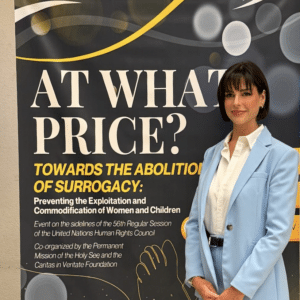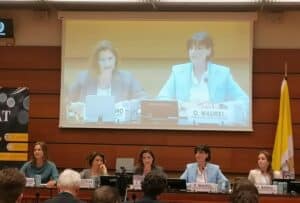Press release Geneva, 18.06.2024
«I was ordered, fabricated, custom-made, sold and bought” (Olivia Maurel, born from surrogacy and spokesperson of the Casablanca Declaration)
The Casablanca Declaration was at the United Nations for an event on the sidelines of the 56th session of the Human Rights Council, to promote the Universal Abolition of Surrogacy.
“The tendency to regulate surrogacy” paves “the way for a substantial acceptance” but “does not address all the ethical questions” and the forms “of exploitation created by the new body market” as it is surrogacy, stated the Italian ministry for Family, Eugenia ROCCELLA, at this event at the United Nations in Geneva on the sidelines of the Human Rights Council. ROCCELLA noted the disparity in legal and ethical treatment: selling a newborn after birth “is a crime” but arranging surrogacy before conception “is legal in many countries”. Italy is the first European country to present a bill to ban surrogacy across its entire territory and classify it as a universal offense. The bill will be presented to the Senate in the coming weeks.
On this first day of work of the Human Rights Council in Geneva, the Casablanca Declaration was at the United Nations to speak against surrogacy. Hosted by the Holy See and the Caritas in Veritate Foundation, and cosponsored by the Republic of Italy and the Order of Malta, the conference «Surrogacy: at what price? Preventing the Exploitation and Commodification of Women and Children» brought a diverse panel of women together to explore the ways in which the international community might begin to work together to end this exploitative practice.
In front of a full room, Olivia MAUREL, born through surrogacy and spokesperson of Casablanca Declaration, denounced that she was “ordered, fabricated, custom-made, sold and bought”. “The idea of being treated as an object slowly destroyed me during the majority of my life” accused MAUREL. The activist also stated that in surrogacy «there is always money involved” and “there is no ethical ways of selling children, there is no ethical way to rent a woman’s body”. Therefore, it is necessary to ban all kinds of surrogacy at an international level, «using an international treaty like the Declaration of Casablanca proposes”.
Dr Gabriella GAMBINO, Undersecretary of the Holy See’s Dicastery for the Laity, Family and Life stated that it is necessary for States to deeply “reflect about surrogacy” and “how to reach a common commitment for the dignity and human rights of those involved”. Surrogacy represents “the institutionalization of the abandonment of the child” who is abandoned at birth by contract. Therefore, the Holy See also alerted to the international community about regulating this practice and the need for a universal ban.
Eva M. BACHINGER, Austrian feminist, journalist and author of “Kind auf Bestellung: Ein Plädoyer für kläre Grenzen [Child on demand: A plea for clear boundaries]” and signatory of the Casablanca Declaration upheld that “surrogacy is a commercial form of exploitation of women’s bodies” and a “violence against the dignity of women» turning the woman “into nothing more than a vessel for the goods she is supposed to deliver, for which payment is made”. “The trade of human beings is illegal, so the worldwide trade in babies from surrogacy should also be illegal” said BACHINGER.
Bettina ROSKA, from ADF International, explains how “surrogacy creates a scenario that undermines the child’s health” and « where the right of the child to his identity is undermined”. Commitment by states at the international level is necessary because “evidence demonstrates that prohibiting surrogacy only on a national level leads to international surrogacy”.
After the International Conference for the Abolition of Surrogacy in Rome on the 5th and 6th April and the inclusion of surrogacy on the directive on preventing and combating trafficking in human beings and protecting its victims by the European Parliament on the 23rd of April 2024, the conference in Geneva on the sidelines of the Human Rights Council regular session is a new step forward on the work of Casablanca Declaration, aimed at protecting children from being sold and safeguarding women from exploitation. The Casablanca Declaration proposes an International Convention for the Abolition of Surrogacy to protect children and women and protect their Human Rights from this «lucrative» market, which is expected to reach $129 billion by 2032, exponentially higher than its estimated 2022 value of $14 billion, according to Global Market Insights.
The Casablanca Declaration for the Abolition of Surrogacy has been promoted by an interdisciplinary and politically transversal group of experts from more than 80 countries and invites States to adopt measures against surrogacy in all its forms and modalities, whether paid or not, and to commit to an International Convention banning the practice on a global level to protect children and their mothers, their rights and dignity, from this market. It includes an annex with a proposal for an International Convention for the Universal Abolition of Surrogacy.


